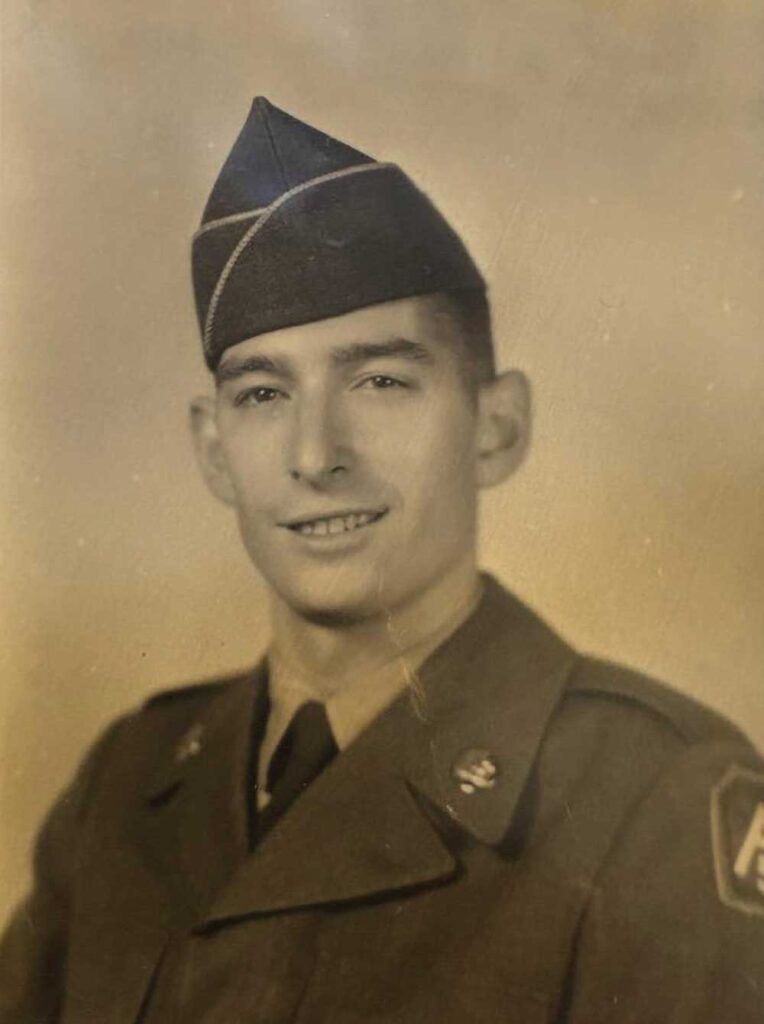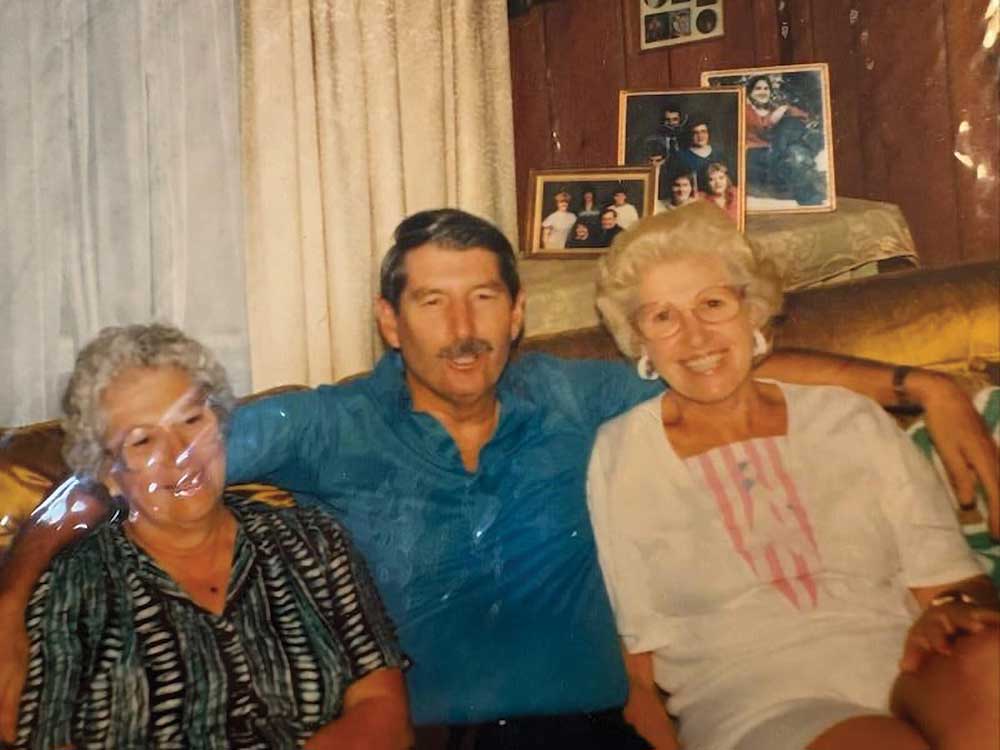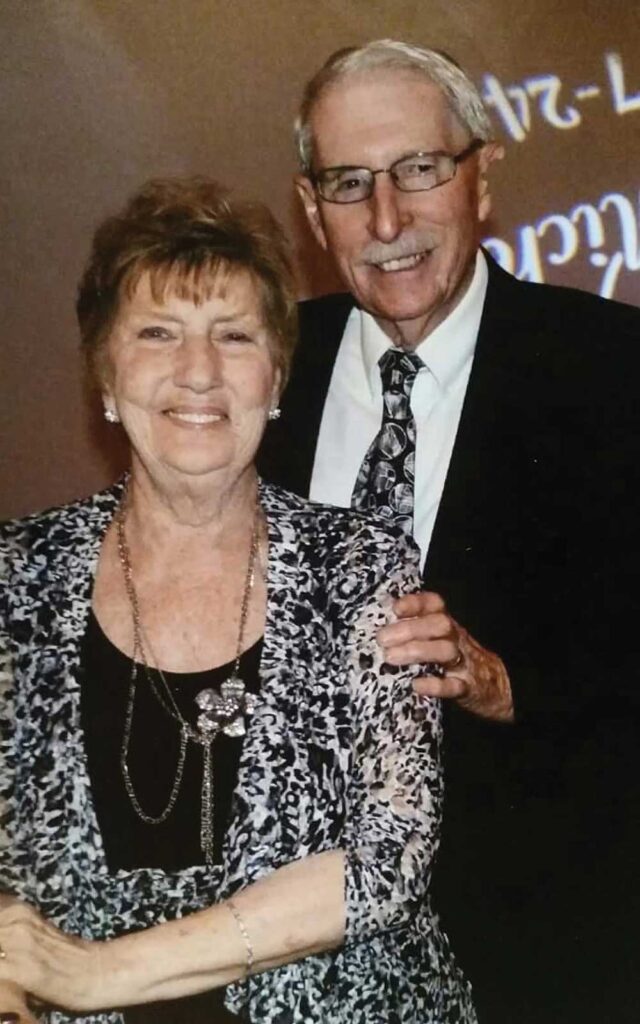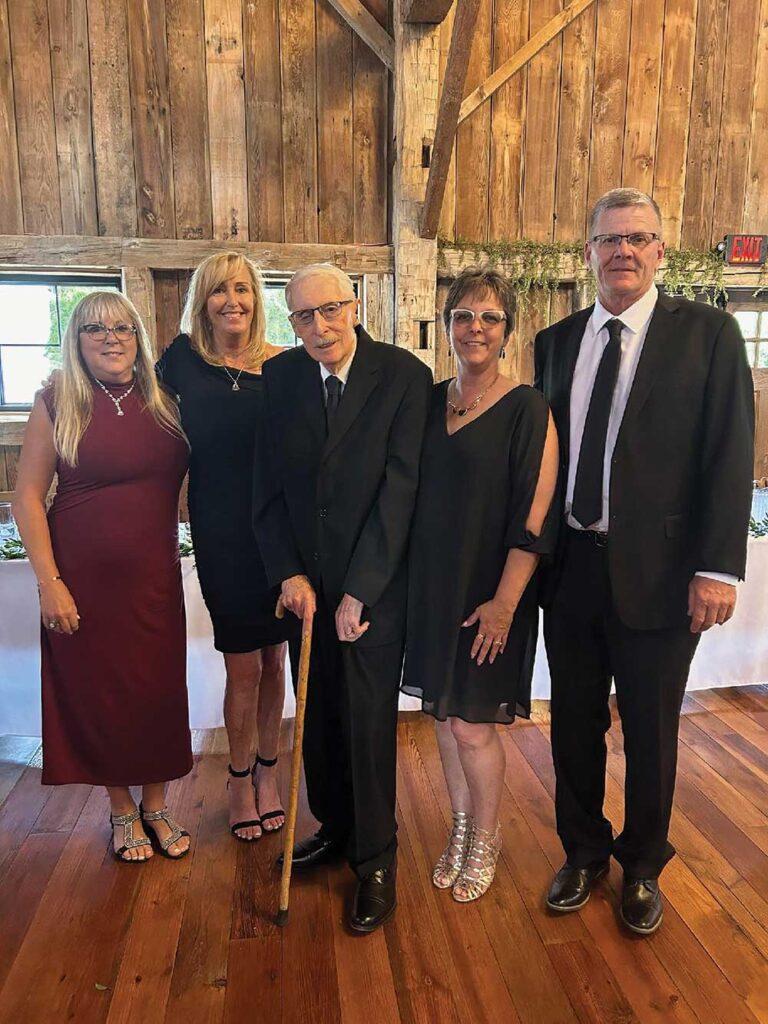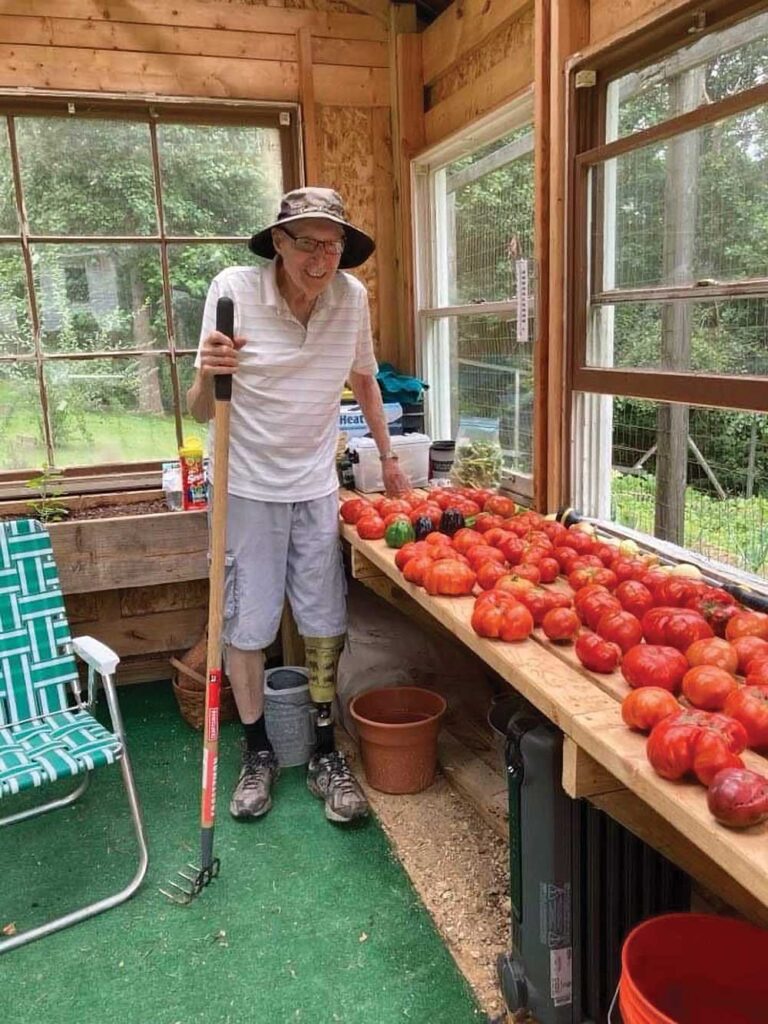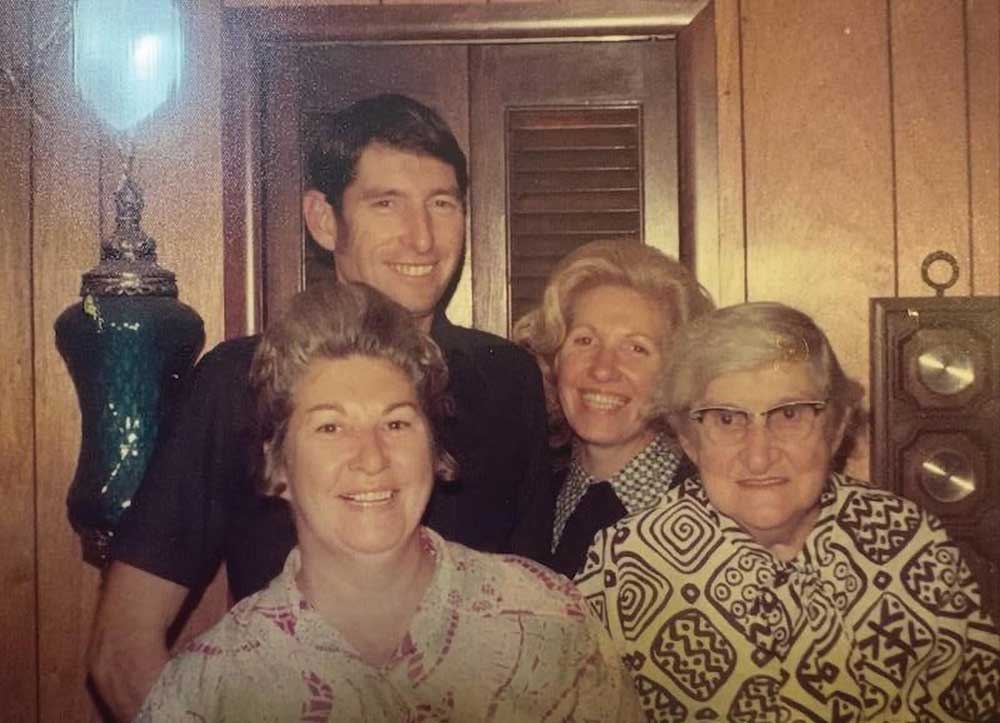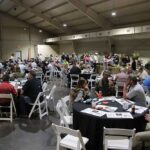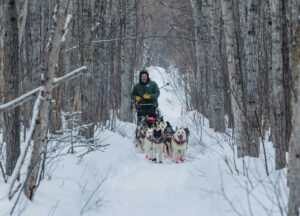
From St. Clair County, Michigan,
to St. Clair County, Alabama
Story by Joe Whitten
Contributed photos
For someone to live 78 years in St. Clair County without ever eating barbecue sounds like cuisine deprivation. But that was 90-year-old Les Johnson’s sad truth. He deserves compassion, however, for he grew up in St. Clair County, Michigan. “I came to Alabama for the first time in 2012, and I ate my first barbecue at Charlie’s in Odenville,” Les admitted, “and I’ve never stopped eating them since.” In St. Clair County, Alabama, he not only enjoyed barbecue but also collard greens, fried okra, butterbeans, and cobbler pie.
Les’s story starts in Canada where his father, Leslie Hontoon Johnson, was born. Leslie was awarded US citizenship for fighting for America in World War I. After the war, he worked as Chief Steward on a Great Lakes freighter. When he was on leave in Port Huron, Michigan, he became friends with Eva Fleming. They fell in love and were soon married.
Because Leslie was on the ship for months at a time, Eva moved back with her parents at the farm. Two daughters, Mary and Grace, were born there, and on July 4, 1934, Les joined them. Today he says all the 4th of July fireworks are for him.
Les enjoyed a special relationship with his grandfather. “I loved living on the farm,” he recounted. “My grandfather died when I was five, but I still remember him. He was over six feet tall, and there weren’t many men that tall then. He had huge hands, and he’d take mine and cover it with his.”
A creek flowed by their farm, and in winter he and his granddad would walk the frozen creek in the snow to the nearest town to buy supplies.
When his grandpa died, his mother ran the farm and his dad continued on the freighter.
Les spoke fondly of the farm. “We sold chickens and eggs and butter. My mother made butter with a churn. The Kroger and A&P stores would call us and tell us how many chickens they needed for the weekend, and we’d get the chickens, stick ‘em in the neck with a sharp knife, and hang ‘em on the clothesline to let the blood drip. Then we had to put them in tubs of hot and cold water and pull all the feathers out.” No automation in those days.
The Johnson children peddled their products on Saturdays to regular customers in Port Huron. “We already had their orders,” Les related. “My sister would take one side of the road, and I’d take the other. We always had eggs and butter. And when strawberries were in, we sold strawberries for 25 cents a quart.”
Just like Alabama kids, Les took chances, without much consideration of consequences. He and sister Mary rode a horse that refused to cross a wooden bridge over the creek. “One day, we decided we’d get at the top of the hill and get him going as fast as we could downhill, so he’d have to cross the bridge.” However, the horse stopped stone still the second his hoofs hit the wood. “The hor se stopped, but we went across that bridge,” he laughed. “We were picking gravel out of our legs for months.”
Les got the better of his sisters many times. He would scrunch himself between his sister and her boyfriend until they paid him to leave. Sometimes he would lock a sister in a room until they paid up. But they loved him, and his 98-year-old sister, Grace, recently said of him, “Les was always so spoiled by everyone because he was so much younger and the only boy. He got away with everything! He was and is so loved by everyone.”
As the ship’s Head Stewart, Leslie Johnson could take his wife on two trips a year and young Les went with her. They would drive to Lorain, Ohio, where the ship unloaded and uploaded. “We would get onboard there,” Les said, “and we’d go through the locks at Sault Ste. Marie and get a ship load up there and come back to Lorain. We had a ’36 Chevrolet, and I’d sit on the armrest on the back seat while my mother drove us back home.”
Those times ended when Les’s dad had a heart attack on ship. The crew lowered him on a stretcher into a Port Huron mail boat which brought him to shore. Leslie was at home for about a month before he died.
The Johnson family continued farming for about two years, then his mother sold the property, and they moved to Port Huron where she took a job as a butcher. Sister Mary had married. Sister Grace lived with an aunt, and 12-year-old Les lived with his mother.
Les recalled having to move. “It was terrible, moving to a city—a city I’d never been to except for shopping. I had to get new friends and go to a different school. The first couple of weeks, I hated it, but then I made some friends and liked it a little bit. But I missed the farm.”
Having learned how to work at the farm, in the city, 12-year-old Les soon had a newspaper route. When he turned 14, he got a job cleaning an appliance store, and when he got his driver’s license, he began delivering appliances. “My first car,” Les laughed, “was a ’29 Model A. It cost me $30.00, and then it cost me $50.00 for insurance.”
On June 16, 1953, Les graduated from Port Huron High School, but perhaps the more memorable event had occurred a few weeks earlier on May 21, 1953. During the afternoon of that day, an F-4 tornado, over a mile wide, wreaked destruction throughout Port Huron, then whirled across the St. Clair River into Canada. In remembering the tornado, Les told how “It blew the roof off the back of our house where my mother was sitting in the kitchen. It never touched her, but she was so frightened that her hair turned white, and it never turned back to brown. The colloquial name for this phenomenon is the Maria Antoinette Syndrome, for her hair is said to have turned white overnight from the trauma of the Reign of Terror’s’ guillotine.
Les enjoyed building and remodeling houses. When asked about this, he said, “I worked for a construction company, and I always loved building stuff. The week before I graduated from high school, I got a job with a construction company, and they said they’d try me out for two weeks. I stayed there for 25 years. When I first started working there, I was in the union, and I got $1.95 an hour. When I retired, I was getting $28.00 an hour.” That company built houses and factories, so Les developed expertise in carpentry and ironwork. He left that company in 1978, then worked for a power company until 1983.
In 1954, Les married Fay Burns, and needing a house to live in, he built it. Having learned never to waste anything, he tore down an old house for material for the new house, salvaging everything. He and Fay pulled out all the nails and filled five five-gallon buckets and sold them for scrap.
Les worked his regular job during the day and worked on their home in the evenings. He had it roughed-in when his draft notice arrived. Three weeks later he was in the army. He boarded up the windows and put tarpaper over the top, and there it sat for two years until he was discharged.
The Johnson children arrived by adoption. Fay and Les adopted Lori in 1962, Steven in 1963, and Lynette in 1968. A few years after, Les’s sister-in-law and her husband both died close together, so, the Johnsons took his niece, Michelle, into their home as their daughter.
Any time the siblings are together, they enjoy recalling good times growing up. “When I was a kid,” Lynette related, “we used to go to a campground called Pigeon River Campground in Michigan. One night when we were sitting around the fire, dad decided to do a rain dance around the fire. It worked! Not only did we have rain that night, we also had a tornado. He still performs a rain dance on occasion.”
Sister Lori added hers. “When dad lost his leg from the work accident, he gave us kids a choice: either a pool or go to Florida. We got both,” she laughed. “When we wanted horses, he drove us all through the country and would say ‘How does that smell?’ We would respond with ‘That smells bad because it’s cow manure!’ Then we went by the horses and would say, ‘Humm that smells good! Must be horse manure!’ That worked too. We got our horses! He taught us a good work ethic. We couldn’t have asked for a better dad!”
Steve’s memory connects with horses. “In 1975, dad bought a frame for a one-horse sleigh at an auction, and he and I restored it in his workshop in the basement. He built the body, the seats, and everything. Some friends of his gave him the harness. We had a few horses, and one was able to pull the sleigh. So, he put bells on it, and at Christmas time he would take us for rides through the snow around the neighborhood in the sleigh. Those were extra special moments—both helping build the sleigh and riding it.”
Michelle’s memory shows Les’s ability to assess character. “I had a date, and our dates were required to come to the door. Les answered the door and told my date, ‘You have 30 seconds to get off the porch and out of the driveway—and you better move it because it’s a long driveway.’ I was so upset, and I cried and cried. But Les said, ‘That boy’s no good, I just know it.’ And low-and-behold, a couple years later that same young man went to jail! I hated to admit that my dad was right,” she laughed, “but he certainly was. He is an amazing man, and we are all blessed to have him in our lives.”
The Johnsons enjoyed the outdoors, especially hunting. They owned a parcel of hunting land, but it had no cabin. Les, who never saw a job he couldn’t do, solved that problem. The Grand Trunk Railway Company’s nearby railyard refurbished boxcars, and Les bought a truckload of boxcar two-by-sixes. “They delivered them,” he said, “and I had a John Deere tractor with a 30-inch sawblade, and I sawed the two-by-sixes down to two-by-fours and framed a cabin in my back yard—bolted the sections together, numbered them, and took it down.”
A friend loaned him a truck to haul the cabin sections to the site. On Les’s brother-in-law’s trailer they put some furniture on, and the two headed out at 3:00 in the morning. They arrived onsite at 7:00 and started working. They finished at 7:00 that night and headed home.
Les enjoyed hunting even after an industrial accident cost him a leg. He and son-in-law Tim often hunted together. “We were walking out of the woods one night,” Tim laughed, “and Les fell over. He said, ‘I stepped in a hole.’ I helped him up. He took one step and fell down again. When I helped him up that time, I noticed that his foot was missing—it had broken off his artificial leg. We hobbled to the cabin and took three of his old legs and engineered a new one for him to get home.”
All of Les and Fay’s children married and raised families in Port Huron. Grandchildren came and the grandparents enjoyed being part of their lives. However, one day Tim dumbfounded everybody by announcing his family was moving to Alabama. His company had transferred him.
When asked how that news was received, Les chuckled, “Well, my wife had a fit. ‘You can’t take my grandkids and go to Alabama! I don’t know where that is.’ I wasn’t happy about it either,” he admitted, “but we helped them move. I drove the U-Haul with Tim. We came at the end of October 2012, and my wife and I stayed that winter with them.”
The tightknit Johnsons adjusted and started making the drive from Port Huron to Alabama. Les and Fay came each winter and enjoyed the warmer Alabama weather.
When Les’s wife died in 2016, he lived alone in their Michigan home for two years. Lynette and Tim encouraged him to sell his home and move to Alabama and live with them, and in 2018 he moved in with them.
Les began attending First Baptist Church Springville with the Hoffmans. He made friends easily and was soon involved with Sunday school and church, the Saints Alive senior group, and the Over the Hill Gang, men who meet at the Farmhouse Restaurant every Friday for lunch.
Desiring to join First Baptist, Les attended the New Members Class with the pastors. Having come from a Methodist and Lutheran background, he needed to be baptized by emersion. But how could a one-legged man get in and out of the baptistery? No problem for two deacons, as Les tells it. “I took my leg off, and Lee Love and Al Rayburn carried me down the steps into the baptistry, and Pastor David DuPre dunked me.”
After the baptism, Pastor Chip Thornton told his favorite story about Les. “He was put under anesthesia for surgery. When they rolled him out of the recovery room, he was flat on his back, still under the effects of anesthesia, but he had his arms in the air, and was saying, ‘Thank you, Jesus! Thank you, Jesus! Thank you, Jesus!’ The congregation loved it and applauded.
One reason Les enjoys Alabama is the long gardening season. “I can garden almost year-round,” Les comments. “Certain things I can plant in the fall, and others in the spring” For early start, he needed a greenhouse, so he and Tim built one. They bought used windows, put a skylight on the roof, and heating bars inside. “I use it to grow tomatoes, peppers, cabbage and cauliflower seedlings, then I give most of them to people in the church,” he laughed. “It’s just fun watching them grow.”
Gardeners at church gave Les hints on Southern gardening, and his grand-son-in-law, Matt Hyatt, of Chandler Mountain, gave pointers as well. Les may be 90 years old, but he still enjoys learning.
And learning more about the Bible, God, and Jesus his Savior is what he enjoys most. When asked about the difference in church and preaching in Michigan and here, he responded: “Like between night and day! I thought I was getting the Word of God,” he lamented, “but I wasn’t. It is so different. Here they go through the Bible. When I first got down here and went to Sunday school class, they could a verse—or one word–and teach on that for a whole hour—what it means and where a word came from. They never did that up north. It’s just a blessing to be down here. I love all our pastors, and I love all the people in my church.” He paused, then added, “And they love me. I couldn’t get used to that at first. When people would say, ‘I love you,’ I thought, parents and my family say that. But down here, they all say they love me!”
And they do. In the spring of 2022, Les was going through a down time resulting from events in October 2021 on a trip to Port Huron. On the first day of that trip, the airline misplaced his luggage, and someone hacked his credit card. On the second day, he stumbled and broke his hip, which resulted in hip-replacement surgery and two weeks of recuperation in a nursing home and three weeks at his daughter Lori’s home. When he finally arrived back home on Beaver Ridge Mountain, he said, “If you want to see me again, come to Alabama.” His spirits were so low that a Sunday school buddy, Chuck Whitiker, suggested to the Sunday school teacher that the class plan a surprise birthday party for Les. The class agreed and managed to keep it secret from Les.
On the day of the party, Lynette and daughter Sara decorated the church’s Family Life Center. Jeri Jenkins prepared the food. Tim’s job was to get Les to the event. By creative subterfuge concerning a church meeting that needed Les in attendance, Tim got Les in the truck; however, Les, being significantly disgruntled, grumbled his discontent all the way to the church. Tim opened the FLC door and frowning Les entered to be greeted with shouts of “Surprise! Happy Birthday!” Thus, he was shocked out of the doldrums into good spirits to enjoy the day.
Les thinks of Heaven often and that his body will be in working order—he’s had 25 plus surgeries, has one artificial leg, an artificial hip, is blind in one eye and has macular degeneration in the other, and he has scalloped edged ears from removed skin cancers. “I’ll have everything new in Heaven,” he laughed.
He recently received a hand-held gadget that allows him to read and listen to the Bible, and that makes him happy. His grandson-in-law, Matt, built a prayer bench for him which they placed in a wooded nook, and in good weather, Les spends time there praying for his family and thanking God for all his goodness and kindness to him. If one happened to be nearby and unseen, he might hear Les singing “And He walks with me and He talks with me, and He tells me I am his own. And the joy we share as we tarry there, none other has ever known,” for “In the Garden” is one of his favorite hymns. The time he has spent in God’s Garden of meditation is reflected in his life. Les Johnson is a one-of-a-kind inspiration.











